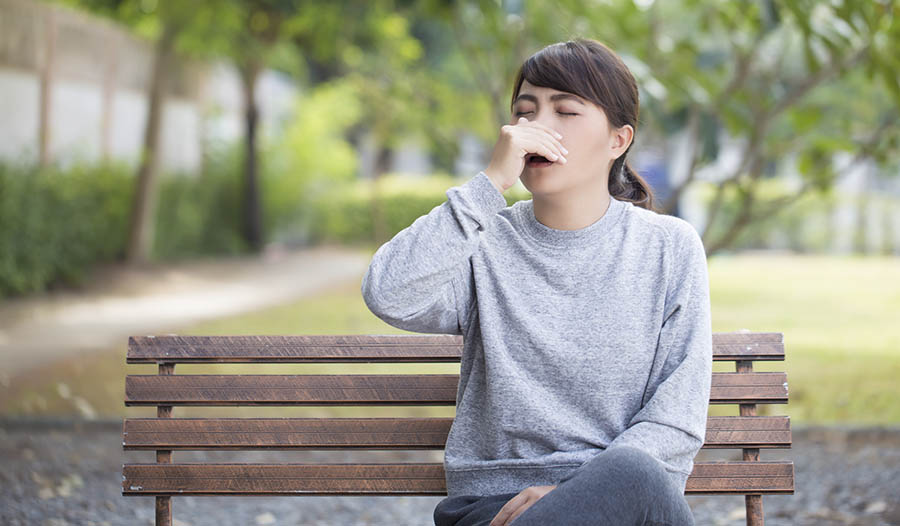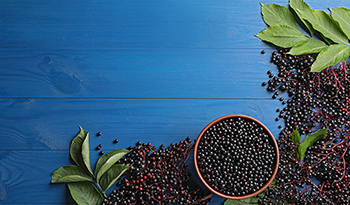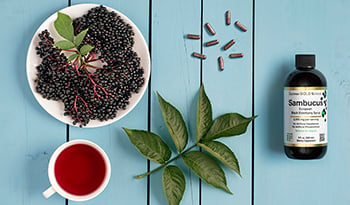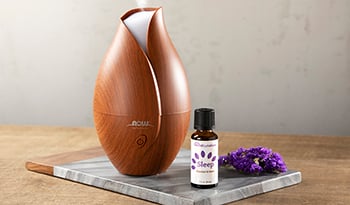Best Home Remedies For A Cough + Sore Throat

Key Takeaways
- Clinical research shows honey is as effective as the common over-the-counter cough suppressant dextromethorphan for relieving nighttime coughs.
- Herbs like ivy leaf, thyme, and marshmallow root have been shown to reduce coughing and soothe irritated throat tissue.
- Try effective remedies at home, including a simple honey-lemon cough syrup or throat sprays with ingredients like propolis.
- Safety First: Never give honey to infants under 12 months.
8 Home Remedies For Cough + Sore Throat
1. Honey
Honey is a known home remedy that has been used for upper respiratory infections (URIs) all across the world. Evidence has shown that honey possesses excellent demulcent and antioxidant properties, a claim that has been supported by the World Health Organization (WHO).
In fact, honey is one of the most widely studied natural ingredients used for treating acute coughs and URIs. Various randomized controlled trials have shown that the use of honey was superior to no treatment and just as effective in treating acute cough compared to the use of over-the-counter dextromethorphan. A study in 2010 comparing the effect of honey, dextromethorphan (DM), and diphenhydramine (DPH) showed that a 2.5 mL dose of honey before sleep has a more alleviating effect on URI-induced cough compared with DM and DPH doses.
Additionally, a Cochrane review in 2018 also showed that honey relieved cough symptoms better than no treatment and diphenhydramine, and again showed no significant difference compared to DM. Therefore, many people prefer a more natural remedy.
2. Homemade Honey-Lemon Cough Syrup
This honey lemon cough syrup recipe includes olive oil, which may reduce inflammation and help coat the throat. The honey may help suppress coughing, especially the nagging type that keeps a person up at night and interferes with getting a good night’s sleep. Any type of honey will do, but buckwheat honey is thought to be the most effective at reducing nighttime coughs in children. Lemon is the third ingredient in this homemade cough syrup. It contains vitamin C, which boosts the immune system, reduces inflammation, and has antimicrobial properties.
Ingredients
- 1/4 cup olive oil
- 3/4 cup raw buckwheat honey (or honey of your choice)
- Juice from three freshly squeezed lemons
Instructions
- Add all ingredients to a small pot. Turn the burner to medium heat.
- Slowly stir and heat until steaming.
- Remove from heat and allow the mixture to cool to room temperature.
- Pour into a jar with a tight-fitting lid.
3. Ivy Leaf + Thyme
One of the best herbs for a cough that has been studied is ivy leaf. In a study conducted in 2021, ivy leaf was shown to be as beneficial and safe as over-the-counter cough medicine in managing URIs and acute cough. Additionally, no adverse effects were noted. Furthermore, a study in 2006 showed that the use of thyme and ivy leaf resulted in a 50% reduction in coughing fits 2 days sooner compared to the use of a placebo.
4. Marshmallow Root
A study looking at the use of Althaea officinalis (also known as marshmallow root) and honey on the effects of acute sore throat was conducted in 2023. The study showed a 50% reduction in symptoms by day 6 with the use of the honey and marshmallow spray compared with over-the-counter chloraseptic spray. Additionally, participants also report improvement in symptoms within 5 minutes with the use of honey and marshmallow.
5. Propolis
Another natural ingredient that has been studied is propolis, also known as bee glue. Bee glue is a natural substance with antimicrobial and anti-inflammatory properties used to maintain upper respiratory tract health. Like the use of honey and marshmallow, bee glue has been shown to have a quicker relief of upper respiratory infection symptoms compared to placebos and other pharmacologic treatments.
6. Herbal Teas
Additionally, herbal teas with turmeric, peppermint, ginger, or thyme have all been shown to have anti-inflammatory and anti-cough properties by breaking down mucous from the lungs.
7. Lozenges/Cough Drops
Persistent coughs are typically soothed with the use of slow-dissolving lozenges. The medication dissolves at a controlled rate to create a protective barrier, which keeps throat tissue hydrated.
A study in 2017 notes that glycerol acts as a demulcent and lubricant on the throat. This same principle applies equally to sugar-based or honey-based lozenges made at home.
There are currently no high-quality randomized controlled trials on homemade lozenges. Most existing literature looks at the use and effect of commercial throat lozenges or sprays. However, the demulcent effect of lozenges (commercial or homemade) is a well-established mechanism. Homemade drops can therefore be expected to provide relief, but their effectiveness has not been tested to the same rigorous standard as honey syrups or standardized herbal syrups.
8. Hydration + Humidifiers
The combination of honey with warm liquids, humidifiers, and sleeping with the head raised above the body can help decrease nighttime coughing.
Upper Respiratory Infection Symptoms
Upper respiratory infections are the most frequent infectious disease in the U.S., with this being the reason for approximately 3% of all outpatient visits. An acute cough refers to symptoms lasting less than 4 weeks and is typically caused by upper respiratory infections. URI symptoms usually include:
- Cough
- Sneezing
- Rhinorrhea
- Nasal Congestion
- Hypo/Anosmia
- Hypo/Ageusia
- Facial Pressure
- Sore Throat
- Headache
- Discomfort
- Myalgias
- Low-Grade fever
Safety + Who Should Avoid These Remedies
Honey provides several advantages, but it remains unsafe for particular individuals. Infants younger than 12 months should never be given honey, as it can contain Clostridium botulinum spores that have been linked to infant botulism. For older children and adults, honey has an excellent safety profile.
People taking multiple medications or those with chronic illnesses should consult a healthcare provider before using ivy, thyme, and licorice.
When Should You See A Healthcare Provider?
Homemade remedies may provide comfort during a short-lived infection, but not all coughs are benign. Medical evaluation should be considered for adults with chronic coughs—symptoms beyond eight weeks. Other reasons to seek care from a healthcare provider include, but are not limited to, hemoptysis (coughing blood), unexplained and unintentional weight loss, fever, or shortness of breath.
FAQs: Acute Cough + Sore Throat Remedies
What is the fastest way to cure a sore throat and cough at home?
The symptoms can be treated by drinking water and using honey, warm teas, and throat lozenges. The majority of acute coughs, together with sore throats, will heal on their own within 7–10 days without needing antibiotic treatment.
Is honey better than cough syrup for cough relief?
Research shows honey works as well as dextromethorphan in over-the-counter medications because it decreases cough frequency and promotes better sleep.
Can children use homemade cough remedies?
Children over 1 year old may benefit from honey-based remedies, but infants under 12 months should never be given honey due to the risk of infant botulism.
When should I see a doctor for a cough or sore throat?
Seek medical help when your symptoms persist beyond 3 to 4 weeks or when you experience warning signs that include high fever, shortness of breath, coughing up blood, and unexplained weight loss.
References:
- Abdulla AM, Davidson A. Infant botulism and honey: an open-access review. Paediatr Child Health. 2012;17(10):e101-e102. Available from: https://pmc.ncbi.nlm.nih.gov/articles/PMC3471134/
- Eccles R. Importance of placebo effect in cough clinical trials. J Thorac Dis. 2017;9(Suppl 12):S1270-S1275. doi:10.21037/jtd.2017.12.41
- Esposito C, Noviello C, Toni F, et al. Honey and cough in children: a systematic review. Phytomedicine. 2021;92:153368. doi:10.1016/j.phymed.2020.153368
- Irwin RS, French CL, Chang AB, Altman KW. Classification of cough as a symptom in adults and management algorithms: CHEST guideline and expert panel report. Chest. 2018;153(1):196-209. doi:10.1016/j.chest.2017.10.016
- Kemmerich B. Evaluation of efficacy and tolerability of a fixed combination of ivy leaf extract, thyme herb extract and primrose root extract in adults suffering from acute bronchitis with productive cough. Arzneimittelforschung. 2006;56(9):652-660. doi:10.1055/s-0031-1296767
- Oduwole O, Meremikwu MM, Oyo-Ita A, Udoh EE. Honey for acute cough in children. Cochrane Database Syst Rev. 2018;4(4):CD007094. doi:10.1002/14651858.CD007094.pub5
- Paul IM, Beiler J, McMonagle A, Shaffer ML, Duda L, Berlin CM Jr. Effect of honey, dextromethorphan, and no treatment on nocturnal cough and sleep quality for coughing children and their parents. Arch Pediatr Adolesc Med. 2007;161(12):1140-1146. doi:10.1001/archpedi.161.12.1140
- Roventa DLC, Dehelean CA, Marcovici I, et al. Natural products in the management of pediatric cough: a systematic review. J Clin Med. 2023;12(18):5813. doi:10.3390/jcm12185813
- Shadkam MN, Mozaffari-Khosravi H, Mozayan MR. A comparison of the effect of honey, dextromethorphan, and diphenhydramine on nightly cough and sleep quality in children and their parents. J Altern Complement Med. 2010;16(7):787-793. doi:10.1089/acm.2009.0311
- Sierocinski E, Feret B, Skoczyński S, et al. Effectiveness of natural honey cough remedy for children and adults: a clinical study. Adv Ther. 2021;38(8):4298-4310. doi:10.1007/s12325-021-01755-4
DISCLAIMER:This Wellness Hub does not intend to provide diagnosis...

















































































 Table of Contents
Table of Contents















